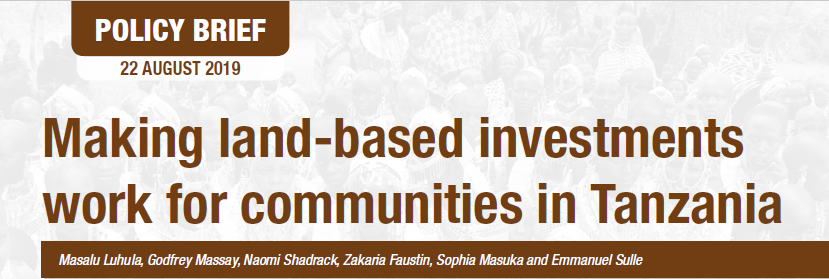Addressing Land Issues Require Sensitive Political Decisions
By Godfrey Eliseus Massay
Land issues remain central to major debates around rural development, in particular their role in developing the agricultural sector in developing countries. Governments, local communities, donors, civil society organizations, academia, and the private sector around the globe are increasingly showing concerns and action to address the growing number of land-based conflicts.
Attempts have been made at the national, regional, or international levels to bring actors from various sectors together to discuss and contribute towards solving suchconflicts. The World Bank is one of the International organisationsthat bring different stakeholders togetherto discuss land and poverty issues every year. This year from March 23 to 27, I had theopportunity to attend the 16th Annual World Bank Conference on Land and Poverty held in Washington DC, USA.The conference this year had over 1,000 participants, from – academia, CSOs, NGOs, private sector and governments representing over 120 countries at the World Bank’s Headquarters discussing the theme “Linking Land Tenure and Use for Shared Prosperity”.
Throughout the conference many participants focused on the issues that affect land tenure and its use. But, one thing was very clear to me since the first day of the conference was that land issues are political, and addressing them requires sensitive political decisions. All actors who are involved in addressing land issues must understand the political economy that underlines these issues in their search for solutions, whichoftentimes are homegrown and based on local people’s demand. Indeed, while delivering keynote speech on the political economy, James Robinson, Harvard Professor and the author of Why Nations Fail, reminded the participants that economic policies such as land don’t just have economic consequences, they influence politics as well. His presentation was based on the inter-connections between land and power, and how it may affect the impact of countries’ land policy choices. However, Prof. Robison did not say anything about how the World Bank and its operations have influenced the political economy of land and land policies in most developing countries and the impacts of such policies on tenure security.
While I admit that the political economy is a complex subject, I second Prof. Robinson’s call to understand it. His presentation made me remember how Tanzanian politics influenced land. Tanzania land laws makesa distinction between use/occupied and vacant/idle land and there is also a clear separation between land rights and natural resource rights, such that natural resource rights trump land rights, and powers to extinguish or restrict land rights are in the executive branch which are more or less the same as police powers. From these laws stem other investment promotion laws and initiatives such as those that promote mechanized and commercial large-scale farming. Land laws in Tanzania have been heavilyinfluenced by the market economy and neo-liberal politics in the way thatit has favored land-based investments in such a way making it difficult for civil society organizations and local communities to reverse land claims and voice their rights and mitigate negative impacts.
One example from Tanzania regarding the importance of understanding the local political economy took place just a few days prior to the land conference at the World Bank when Action Aid Tanzania, launched their investigative report on the outcomes of a the Eco-Energy land investment project in Bagamoyo district. One of the weaknesses highlighted in the report was the lack of wider community consultation by the company. The report concluded that the project has violated the principles of the Tirana Declaration andshould be suspended. The conclusions of the report have been heavily criticized by the Government of Tanzania, IFAD and the private sector. As a shareholder of the Eco-energy project, the Government of Tanzania has a vested interest in making the project continue and this may explain their unwillingness to ignore the concerns of the local communities affected by the project. Understanding the political economy of land in Tanzania is thus an important aspect to understand why these land conflicts persists.
All actors who have a stake in land should forge efforts to address these land conflicts that are caused by increased investment in farmlands, climate change, urbanization, and competing interests between and among land user groups. Such efforts must seek to improve and invest in land use planning, mapping and documentation, protection of women rights, recognition and expansion of bundle of rights, technology and monitoring of open data, and up-scaling the best practices. These require not only sensitive political decisions but also realism and persistence.
In the end, these commitments should serve the purpose of contributing to increased well-being for people. This will ultimately not only generate revenue for the government, balance justice issues as well as eliminate poverty and bring about shared prosperity to all.
For more information about the 16th Annual World Bank Conference
- Conference Agenda: https://www.conftool.com/landandpoverty2015/sessions.php
- Keynote Speech: http://live.worldbank.org/world-bank-conference-land-and-poverty-2015
- Selected Sessions: http://www.worldbank.org/en/events/2014/08/06/landconference2015#7
- Feature Story: http://www.worldbank.org/en/news/feature/2015/04/23/data-and-analysis-for-more-secure-land-rights-better-land-use-and-shared-prosperity
Photos:https://plus.google.com/u/0/photos/104110480112896716484/albums/6129615144374756673?sort=1

